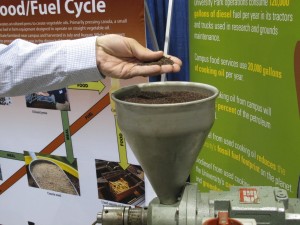Penn State Turns Canola Seed Into Fuel

Scott Detrow / StateImpact Pennsylvania
Penn State's Farm Show canola press
In the far northern corner of Harrisburg’s Farm Show complex – past the food court, the tractor displays and the model cabins in the Exhibition Hall – there’s a row of energy displays.
The Marcellus Shale Coalition has a booth. So does America’s Natural Gas Alliance. Solar energy advocates are represented, along with realtors selling geothermal home heating units. I spotted a scaled model of a wind turbine, too.
Penn State University’s College of Agricultural Sciences anchors “energy row,” with a large display showcasing alternate energy and fuel efforts being researched at the school. I visited the PSU for a story on the Farm Show’s butter sculpture, which will be converted into energy after the show ends. (Stay tuned – the butter story will be published tomorrow.)
During my visit, Daniel Ciolkosz directed me to a machine that was quietly chugging away in the corner, squeezing oil out of canola seeds.
Ciolkosz, an associate at the school’s Biomass Energy Center, explained Penn State is now running diesel-powered tractors on a canola oil-based fuel. One bushel of canola seed yields a bit more than two gallons of fuel.
In the video below, you can see Ciolkosz explain the process. A press squeezes the canola seeds, which are packed with oil. The liquid drips into a bucket, where it’s collected for fuel use. The solids are pressed into a meal, which can be fed to animals. And as Ciolkosz explains, the canola oil can sometimes be used to fry food before it goes into the tractor fuel.
A lot of yield from a tiny canola seed.
















